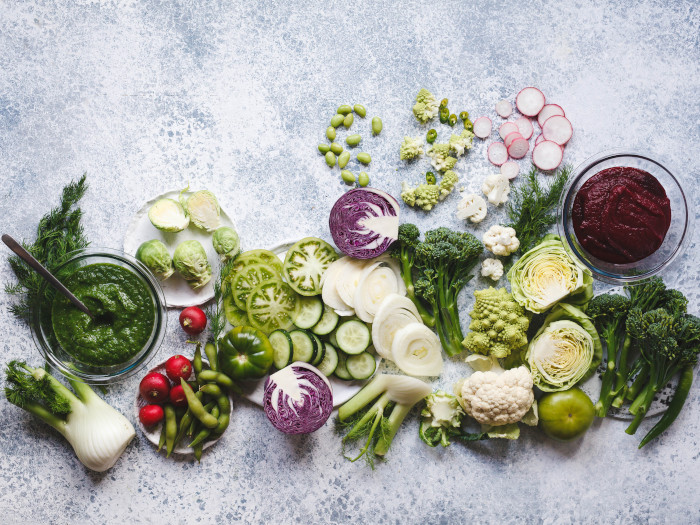Following a plant-based diet is a popular choice for many people who want to lose weight, eat clean or enjoy any number of other health benefits.
What is a Plant-Based Diet?
A plant-based diet is a vegetarian diet that consists only of things that grow on the ground, as well as overly processed versions of plant-based food. This means that a plant-based diet will eliminate meat, fish, oil, fats, processed foods, sugar, chemicals, salt, and refined grains. Many people call plant-based diets vegetarian diets, but there are some differences since some vegetarian diets include the consumption of processed foods and animal products, such as eggs or dairy products.
All of the nutrients we need can be found in a plant-based diet, but if you want to ensure that you don’t become nutrient deficient, there are some guidelines that should be followed. Generally speaking, fruits and vegetables are well known as healthy means of acquiring calories and nutrients, particularly antioxidants, vitamins, and minerals. Getting the necessary levels of protein and fat is entirely possible on this diet, although effort and diet diversification is required to fulfill all your nutrient needs. [1]

You can rustle up a sumptuous vegetarian meal in half an hour or less. Photo Credit: Shutterstock
Plant-Based Diet Meal Plan
If you are a beginner who wants to pursue a plant-based diet, this is a simple meal plan that may guide your early efforts. Some people recommend slowly eliminating meat-based products and refined foods, to make the transition easier.
- Breakfast – Fruit smoothie with bananas, strawberries, spinach, blueberries, and freshly squeezed juice.
- Lunch – Edamame and hummus wrap, raw carrots
- Snack – Roasted chickpeas
- Dinner – Gluten-free mushroom lasagna
- Snack – Baked zucchini chips
Plant-Based Diet Benefits
There are many benefits to a plant-based diet, including the following:
- Preventing obesity
- Better control of your cholesterol levels
- Regulating blood pressure
- Lowering the risk of cancer
- Managing diabetes
Let us discuss them in detail below.
Weight Loss
Since plants tend to be more nutrient-dense and lower in calories than other forms of carbohydrates, it is easier to stay within your calorie restrictions on a daily basis, helping to aid in weight loss efforts and preventing obesity. [2]
Blood Pressure
One of the major causes of hypertension is a poor diet that is high in salt, fat, and processed foods, coupled with a lack of vitamins and critical minerals. Fruits and vegetables are high in potassium, which can help regulate the symptoms of hypertension. [3]
Cholesterol
With fewer animal products and dairy products, you will be taking in fewer saturated fats and unhealthy cholesterol; instead, you will get better healthy fats from legumes and other plant-based options. [4]
Diabetes
A 2017 report in The Journal of Geriatric Cardiology sums up several research studies that a whole food plant-based diet which includes legumes, whole grains, fruits, and vegetables is beneficial to prevent diabetes. It also helps improve overall health in people with diabetes. [5]
Cancer
Preliminary results of research led by Gordon A. Saxe, MD, Ph.D., Department of Family and Preventive Medicine, Moores UCSD Cancer Center, University of California, suggested that adopting a plant-based diet may help in reducing the progression of prostate cancer. [6]
A 2011 study in the journal Cancer Management and Research shows that red and processed meat can increase your chances of cancer. It suggests that a plant-based diet, comprising of fruits and vegetables that are rich in fiber, antioxidants, and phytochemicals may help in weight management and lower your risk of cancer. [7] [8]
Research conducted at the Stanford Prevention Research Center, Stanford University School of Medicine in 2008 states that plant-based diets are important to prevent cancer. The results of the study show that a low-fat vegan diet is a potential option of including more protective nutrients and phytochemicals and decreasing the occurrence of chronic diseases like cancer. [9]
Moreover, a plant-based diet is also adopted for its ability to reduce the negative side effects of chemotherapy in cancer patients. [10]

A plant-based diet helps improve heart health. Photo Credit: Shutterstock
Plant-Based Diet vs Vegan Diet
While a plant-based diet can often resemble a vegan diet, there are a few key differences, both in practice and philosophy.
- A plant-based diet may be pursued by someone who feels a moral obligation not to consume animal products, but veganism often affects other aspects of life as well, such as the types of clothes you wear and what companies you support.
- Due to the nature of a plant-based diet, eating certain foods that are considered “vegan” would not necessarily fit in a plant diet, because it doesn’t resemble the “original” form of the plant. On the other hand, plenty of people who pursue a plant-based diet are not necessarily vegan in terms of their philosophy.
Plant-Based Diet Risks
The major risks of following this type of diet include deficiencies in key nutrients, namely protein, vitamins, minerals, and fats. It can be easy to get enough calories, but you may be consuming more carbohydrates than you need while skimping on protein and fat intake. If you want to switch to this diet, you should have a plan to monitor your nutritional intake, at least for the first few weeks. You should also consult with your doctor before jumping into any new diet. [11]
